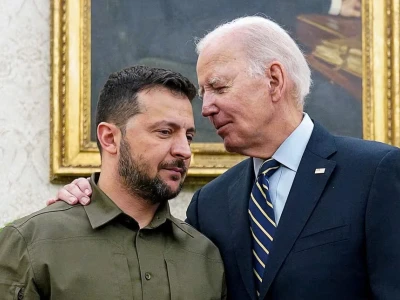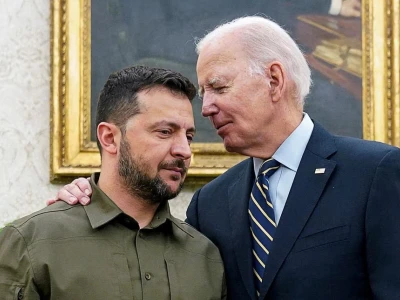
Biden says Ukraine 'stands strong', Russia gives nuclear warning
Putin has over the past year repeatedly hinted that Russia could use a nuclear weapon if threatened.
WARSAW/MOSCOW, Feb 21 (Reuters) - U.S. President Joe Biden said on Tuesday Ukraine "stands strong" a year after Russia's invasion and that Moscow would never defeat it, speaking hours after the Kremlin suspended a landmark nuclear arms control treaty over the West's support for Kyiv.
Biden's remarks, in a speech at Warsaw's Royal Castle in Poland following a surprise visit to Ukraine, countered an address shortly before by Russian President Vladimir Putin in which he vowed that Moscow would achieve its objectives in Ukraine and accused the West of plotting to destroy Russia.
Alleging that the United States was turning the Ukraine war into a global conflict, Putin said Russia was suspending participation in the New START treaty, its last major arms control treaty with Washington.
Putin, upping the ante in Moscow's biggest confrontation with the West since the 1962 Cuban Missile Crisis, also announced that new strategic systems had been put on combat duty and threatened to resume nuclear tests.
With the anniversary of the invasion coming on Feb. 24, Biden declared "unwavering" support for Kyiv and a commitment to bolstering NATO's eastern flank facing Russia, while rejecting Moscow's contention that the West was planning to attack Russia.
"One year ago, the world was bracing for the fall of Kyiv," Biden said. "I can report: Kyiv stands strong, Kyiv stands proud, it stands tall and, most important, it stands free.
"When President Putin ordered his tanks to roll into Ukraine, he thought we would roll over. He was wrong," he said.
Biden added: "Appetites of the autocrat cannot be appeased. They must be opposed. Autocrats only understand one word: no, no, no. No, you will not take my country."
He did not mention Russia's START suspension in his speech, but said Washington and its allies did not seek to control or destroy Russia through their solidarity with Kyiv.
"The West was not plotting to attack Russia, as Putin said today ... This war was never a necessity. It's a tragedy. President Putin chose this war," Biden said.
NATO allies and other supporters have sent Ukraine tens of billions of dollars worth of increasingly heavy war weaponry and ammunition, with modern battle tanks promised and some mulling Kyiv's appeals for fighter jets and longer-range missiles.
Russia suffered three major battlefield reverses in Ukraine last year but still controls around a fifth of its neighbour and appears to be inching forward in an offensive in the east.
'IRRESPONSIBLE'
U.S. Secretary of State Antony Blinken called Putin's New START suspension "deeply unfortunate and irresponsible". NATO Secretary-General Jens Stoltenberg said it made the world a more dangerous place, and urged Putin to reconsider.
Russia's foreign ministry said later that Moscow intended to continue abiding by restrictions in the treaty on the number of warheads it could deploy. Washington left room for Moscow to change course, with Blinken saying it would be watching to see what Moscow actually did.
Signed by then-U.S. President Barack Obama and his Russian counterpart Dmitry Medvedev in 2010, the treaty caps the number of strategic nuclear warheads the countries can deploy.
Due to expire in 2026, it allows each country to physically check the other's nuclear arsenal, although tensions over Ukraine had already brought inspections to a halt.
Putin said, without citing evidence, that some in Washington were considering breaking a moratorium on nuclear testing and if that happened, Moscow would do the same.
He added that a week ago he had signed a decree on "putting new ground-based strategic systems on combat duty". It was not immediately clear which systems he meant.
NUCLEAR THREATS
Putin, who has over the past year repeatedly hinted that Russia could use a nuclear weapon if threatened, was in effect saying that he could dismantle the architecture of nuclear arms control unless the West backs off in Ukraine.
"They intend to transform a local conflict into a phase of global confrontation," he said. "This is exactly how we understand it all and we will react accordingly, because in this case we are talking about the existence of our country."
Putin said the conflict had been forced on Russia, particularly by NATO's eastward expansion since the Cold War.
"The people of Ukraine have become the hostage of the Kyiv regime and its Western overlords, who have effectively occupied this country in the political, military and economic sense."
Kyiv and Western leaders such as Biden reject that narrative as an unfounded pretext for a Russian land grab in a fellow former Soviet republic that Putin calls an artificial state, and say he must be made to lose his gamble on invasion.
A senior aide to Ukraine's president said Putin's speech showed he had lost touch with reality.
As Putin was speaking, at least one Russian rocket slammed into a busy street in the southern Ukrainian city of Kherson, killing six people. Ukraine's military and city authorities said 12 others were wounded in the attack.
Local authorities said Kherson came under fire from multiple rocket launchers while Putin portrayed the West as the aggressor in Ukraine and Russia as not waging war on the Ukrainian people. Russia did not immediately comment on the incident.
Moscow has denied deliberately targeting civilians in its "special military operation".
In Geneva, the U.N. human rights office said it had recorded more than 8,000 civilian deaths, 90% from explosive weapons, and described the figure as only the "tip of the iceberg" with thousands more thought to have died.




